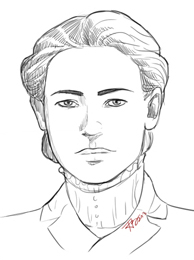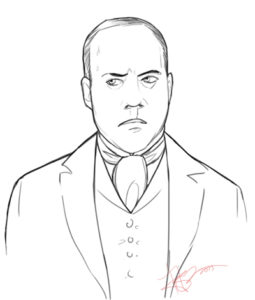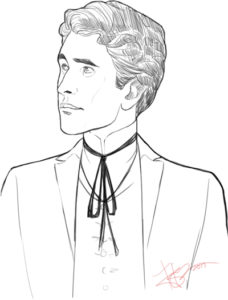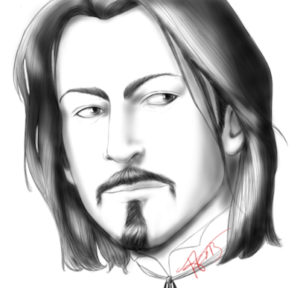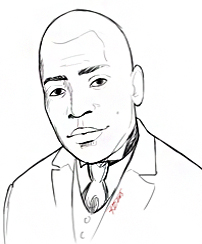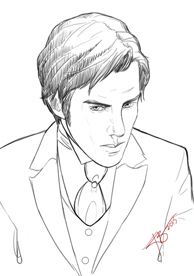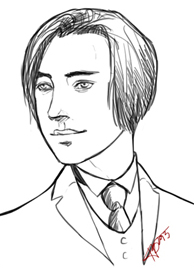Included below is a complete list of the main characters that appear in both The Alienist and The Angel of Darkness. You can find further information about these characters in their own sections of the website. For the supporting and minor character pages of the Alienist character list, please use the menu.
Howard, Miss Sara
To learn more, visit the Sara Howard section
Sara Howard is a strong and determined young woman, and the only female member of the investigative team. Over the course of the novels we learn that Sara is the only child of an invalid mother and a wealthy father who raised her as he would have raised a son; Sara’s friend, John Schuyler Moore, claims that she can “ride, shoot, gamble, and drink with any Hudson Valley gentleman” (A 90). She was brought up between her family’s city house on Gramercy Park and their country estate in Rhinecliff, NY. We know that Sara went to college and spent a summer assisting a visiting nurse in the Tenth Ward, but beyond these details we are told little of her background.
At the outset of The Alienist, Sara is employed as a police secretary, an occupation she only had the opportunity of pursuing when Theodore Roosevelt made the revolutionary decision to hire two female police secretaries upon becoming Police Commissioner. Given the secretive nature of the investigation in the novel, the team require a police liaison who can relay their progress back to Roosevelt without raising suspicion. Sara is keen to take on the position and requests John accompany her while she visits the family of the murder victim prior to the official start of the investigation because she has suspicions that the police officers who visited the family may have been covering something up. Sara’s suspicions are justified, and as a result of her demonstrated capacity for taking initiative, John agrees to vouch for Sara and the pair convince Roosevelt to let her take on the role of liaison.
Isaacson, Detective Sergeant Lucius
To learn more, visit the Isaacson brothers section
Detective Sergeant Lucius Isaacson is the younger brother of Detective Sergeant Marcus Isaacson and provides forensic medicine expertise to the investigative team. Lucius and Marcus were among the new police recruits hired by Theodore Roosevelt in his attempt to rid the police force of corruption, and were handpicked by Roosevelt to join the investigation in The Alienist due to their lack of loyalty to any of the force’s corrupt ‘old guard’ as well as their progressive methods in the newly established forensic sciences. We know little of Lucius’ background prior to joining the police force except that his parents were Jewish immigrants, he has one younger sister, and he went to medical school before joining his brother in working at the Pinkerton Detective Agency for a brief time. As with Marcus, he is a bachelor and the brothers still live at home with their mother for the duration of the novels.
Both of the Isaacson brothers are hyper-analytical and were drawn to detective work after reading Wilkie Collins’ novels as boys. Of the two brothers, Lucius is more prone to anxiety and can be easily flustered, but he also has a tendency to “grandstand” which is frequently the source of many bickering arguments between the brothers throughout the novels. Even so, the younger Isaacson’s competence is unquestionable and his skills in forensic medicine are an invaluable asset to the team.
Isaacson, Detective Sergeant Marcus
To learn more, visit the Isaacson brothers section
Detective Sergeant Marcus Isaacson is the eldest of the Isaacson brothers and provides the investigative team with forensic and legal expertise. Unlike Lucius who attended medical school, Marcus trained as a lawyer before becoming a detective. Described as the more handsome of the brothers, with curling dark hair and attractive features, Marcus is also less prone to anxiety than Lucius. Nevertheless, his concerns over how he and his brother are perceived by other members of the police force following Lucius’ “grandstanding” at a crime scene in The Angel of Darkness indicates that despite his apparent self-confidence, he may actually be the more insecure of the pair. For further information on the Isaacson brothers’ background, please see Detective Sergeant Lucius Isaacson’s character summary above.
Although he did not receive any medical training, Marcus assists Lucius during The Alienist in the conduct of postmortems and is responsible for locating a partial fingerprint left by the murderer that allows the team to tie a three year old cold case to the murders in the novel. Marcus is also responsible for finding several important crime scene clues such as rope fibers and distinctive marks on the walls of the crime scene buildings that were left by nail-studded boots. As with Lucius’ medical evidence, these clues help Dr. Kreizler refine his psychological profile of the killer.
Kriezler, Doctor Laszlo
To learn more, visit the Laszlo Kreizler section
Dr. Laszlo Kreizler, the leader of the investigative team in The Alienist and The Angel of Darkness, is a specialist in child and criminal psychology. He is a pioneer in the theory of “context,” the idea that personality and behaviour is determined by an individual’s childhood experiences, and he applies this theory to the creation of psychological profiles of the killers being pursued by the investigative team. In this way, Caleb Carr has stated that he wanted to create Dr. Kreizler as a character who would be able to “solve all the crimes [Sherlock] Holmes couldn’t, in which there’s little or no physical evidence and no apparent motive — the product of aberrant criminal psychology.”1 In keeping with this, Dr. Kreizler is described as one of the foremost experts on criminal insanity in New York, and when he is not involved in the team’s investigations, he works as an expert witness on criminal cases as well as running the Kreizler Institute for Children, a centre he founded for the study and treatment of children with psychological disorders brought about by environmental factors.
The protagonist of both Alienist books, Dr. Kreizler’s role as a psychological profiler is essential to both investigations. He is responsible for initiating the investigation within The Alienist in collaboration with Theodore Roosevelt, and although it is Sara Howard who is first presented with the child abduction case in The Angel of Darkness, she knows that without Dr. Kreizler’s help, the investigative team will be unlikely to solve the case. Nevertheless, Dr. Kreizler knows that hunting for the killers in both investigations is not a one-man job, and early in The Alienist he is responsible for determining what additional expertise the investigative team requires for him to be able to successfully perform his role as a profiler. Without the forensic expertise of the Isaacson brothers, John Schuyler Moore’s knowledge of New York’s criminal underground, Stevie Taggert and Cyrus Montrose’s knowledge of life on the streets, and Sara Howard’s skills as a private detective, the doctor would be unable to construct the profiles necessary for pre-empting the next move of the killers in both novels; profiles that eventually result in their identification and apprehension.
Montrose, Mr. Cyrus
To learn more, visit the Cyrus Montrose section
Cyrus Montrose, the only African American on the investigative team, is described by John Schuyler Moore as Dr. Laszlo Kreizler’s “valet, occasional driver, effective bodyguard, and alter ego” (A 28). As with Stevie Taggert, Dr. Kreizler’s young ward, and Mary Palmer, his housekeeper, Cyrus came into Dr. Kreizler’s household as a result of his troubled past. Approximately ten years prior to the events of The Alienist, Cyrus was found guilty of murdering a drunken Irish police officer who had assaulted a black prostitute. Dr. Kreizler was brought in as a consultant on the case, and upon learning that Cyrus had witnessed his parents’ torture and murder during the draft riots of 1863, he argued that the prostitute’s assault had caused him to return to the moment of his parents’ death and he had reacted “the only way possible for a man with his background” (A 35). Sympathetic to the Doctor’s argument, the presiding judge agreed to release Cyrus into Dr. Kreizler’s employ to aid rehabilitation.
Despite Cyrus’ criminal background and intimidatingly large physique, he is the most reserved member of the investigative team. Although initially only required to fulfill duties on the team related to his employment for Dr. Kreizler during The Alienist, Cyrus displays a keen interest in the investigation from the start, with John noting that he “managed to get hold of much of the reading material that Kreizler had assigned to the rest of us, and he devoured it eagerly. He made no comments during meetings save when asked, but at those moments he often proved quite insightful” (A 187).
Moore, Mr. John Schuyler
To learn more, visit the John Moore section
John Schuyler Moore, a crime reporter for The New York Times, is the narrator of The Alienist and remains a key member of the investigative team in The Angel of Darkness. Even though John is a little slower on the uptake than other members of the investigative team in both novels, his extensive knowledge of New York’s underworld is critical to the success of both investigations, and he also has a laid-back, charming personality that almost all members of the team find easy to get along with. Although he was born into a wealthy family, John’s knowledge of New York’s criminal classes was founded during his adolescence when, as a rebellious teenager, he and his brother would go slumming in the Gas House district. Nevertheless, we know that he still developed friendships within his own class as his associations with Dr. Laszlo Kreizler, Theodore Roosevelt, and Sara Howard were all formed during this period.
Knowing how important a working knowledge of New York City’s criminal element would be during the investigation in The Alienist, it is two of these old friends, Dr. Kreizler and Roosevelt, who encourage John to take part in the investigation at the outset of the case. In turn, it is John who helps Sara Howard, then working as a police secretary, to secure the role of police liaison on the team. Due to his close friendships with these important members of the team, along with his personable temperament, John becomes the primary bridge between the remaining members of the investigative team and Dr. Kreizler, his primary partner on the team throughout the course of the novel. In consequence of this, John is intimately involved with all aspects of the investigation and, despite not being particularly driven in terms of work, he is able to help the team in more respects than just his knowledge of New York’s underworld by putting his investigative skills to good use throughout the course of the novel.
John’s portrayal in The Angel of Darkness is significantly more comedic than his portrayal in The Alienist, partly because the novel is narrated by Dr. Kreizler’s ward, Stevie Taggert, who enjoys John’s company but has little tolerance for his tendency to “put on airs”, and consequently makes his friend the butt of many jokes throughout the novel. Although this humorous portrayal provides great comic relief, it does mask some of the important work John is responsible for during the investigation.
Taggert, Master Stevie
To learn more, visit the Stevie Taggert section
Stevie Taggert, Dr. Laszlo Kreizler’s loyal ward and part-time driver, provides ancillary assistance to the investigation in The Alienist before graduating to the role of narrator in The Angel of Darkness. Although Stevie is only in his early teens during the novels, he is unusually bright for his age and demonstrates a high degree of emotional maturity that allows him to provide insight into the actions and motivations of the killers pursued in both novels that other team members occasionally overlook. These aspects of his character, along with his bravery and resilience, are likely to have originated in Stevie’s early youth spent fending for himself on the streets of the Lower East Side.
Stevie started his life in a one-room rear tenement flat near the Five Points district, and learnt to pickpocket from an early age in order to support his mother’s drinking habits. Growing tired of the “string of men” his mother would bring home to the flat, as well as her transition from alcohol to opium, Stevie left home at the age of eight to sleep on the streets with a gang of street arabs. During this time, Stevie became notorious as a “banco feeler, pickpocket, and general criminal handyman” (AoD 58) and was approached by Crazy Butch from Monk Eastman’s gang to work for the kids auxiliary of the gang. After a short time with the gang, Stevie was apprehended for breaking a store owner’s leg during a theft and was sentenced to two years at the Boys’ House of Refuge on Randalls Island. Returning to court three months later after attacking a guard who had attempted to molest him, Stevie was given an opportunity to be interviewed by Dr. Kreizler who recommended that he be entrusted to his care for rehabilitation rather than being returned to a correctional facility.
References
1. Naparstek, Ben, “Carr Trouble”, The Age 6 November 2005. Link.

